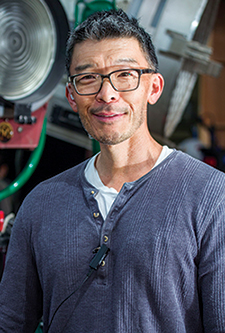Summer 2015

First AD Ken Wada has been settled comfortably in episodic television for the last decade, working on hits like Alias, Weeds, Samantha Who? and The Middle, where he's been on every episode. But Wada says the AD's mantra, "safety is no accident," hit home years before while working the sometimes treacherous Hawaiian water locations on Baywatch.
"I was firsting on their rescue unit, where we'd launch eight or nine boats at dawn and head out to the outer islands," he remembers. "I was typically on the Scarab, which is a fast, low-profile speedboat that could maneuver close to the actors."
Wada says legendary water-safety experts like Brian Keaulana, taught him that safety is a team effort, noting that his Baywatch unit never experienced a shark attack, despite hundreds of hours in open water.
"Brian trained us to function underwater for long periods of time by running with boulders and rocks along the sandy bottom while towing six to 10 people," he says. "The goal was to try to relax."
Staying calm on location for K-19: The Widowmaker (2002) was a different kind of challenge for Wada, who recalls a pre-dawn scene inside a Moscow military complex.
"The main gate was locked, and because the Russian production company kept bankers' hours—8:00 to 5:00—there was no one to call," Wada says. "So, I hopped the fence and was walking through the snow to find a door and turn on some lights. It was freezing, and I was covered head-to-toe in black knit. Marching toward me were a dozen Russian soldiers on patrol and I'm thinking: 'I'm dead! I don't even have my passport.' Amazingly, they walked right past, and we found a way to get inside."
Wada says some of his proudest career moments have been those tied to the DGA's Asian American Committee, which he co-chaired for several years.
"I've been fortunate to work on some independent films—
historical and modern-day—that resonate with my background," he says. For the
period short Day of Independence (2003), set in a Japanese-American internment camp during World War II, Wada put the word out through the Asian American Committee that he needed some help.
"I'll never forget driving to the set for the first time, which was open farmland in the hot sun, and seeing volunteers building the barracks. It was rewarding to know I was part of telling that story."